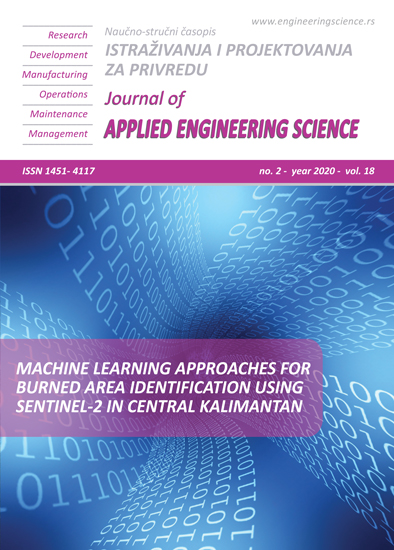COMBINING THE DELAYED DIFFERENTIATION POLICY AND COMMON PARTS’ PARTIAL OUTSOURCING STRATEGY INTO A MULTI-ITEM FPR-BASED SYSTEM
Abstract
This study investigates a multi-item finite production rate- (FPR-) based system incorporating a delayed product differentiation policy and common parts’ outsourcing strategy. A two-stage fabrication scheme is proposed, wherein, in stage one, all common parts of the end products (assuming they have a known completion rate as compared with the finished products) are partially produced in-house and partially supplied by an outside contractor with an extra unit outsourcing; in stage two, all end products are finished in sequence, under a rotation fabrication cycle time discipline. An explicit model is developed to clearly represent the proposed problem. Through the optimization technique, the optimal rotation cycle decision is obtained. Thus, diverse characteristics of this particular multi-item, FPR-based system with postponement and outsourcing strategies can now be revealed. As demonstrated by numerical illustrations, these characteristics include the (i) convexity of the system cost function, (ii) impact of common parts’ outsourcing strategy on the utilization, (iii) breakup of system cost components, (iv) combined impact of the outsourcing ratio and common parts’ completion rate on the system cost function, and (v) effect of the outsourcing ratio on optimal rotation cycle decision. Our decision-support-type system can facilitate production managers in achieving their goals of reducing orders’ response times and minimizing the overall system cost.
References
Taft, E.W. (1918). The most economical production lot. Iron Age, 101, 1410–1412.
Bastian, M. (1986). Joint replenishment in multi-item inventory systems. Journal of the Operational Research Society, 37(12), 1113-1120.
Perez, A.P., Zipkin, P. (1997). Dynamic scheduling rules for a multiproduct make-to-stock queue. Operations Research, 45(6), 919-930.
Balkhi, Z.T., Foul, A. (2009). A multi-item production lot size inventory model with cycle dependent parameters. International Journal of Mathematical Models and Methods in Applied Sciences, 3(2), 94-104.
Leachman, R., Gascon, A. (1988). Heuristic scheduling policy for multi-item, single-machine production systems with time-varying stochastic demands. Management Science, 34(3), 377-390.
Wolsey, L.A. (2002). Solving multi-item lot-sizing problems with an MIP solver using classification and reformulation. Management Science, 48(12), 1587-1602.
Absi, N., Kedad-Sidhoum, S. (2009). The multi-item capacitated lot-sizing problem with safety stocks and demand shortage costs. Computers and Operations Research, 36(11), 2926-2936.
Garn, W., Aitken, J. (2015). Agile factorial production for a single manufacturing line with multiple products. European Journal of Operational Research, 245(3), 754-766.
Chiu, S.W., Wu, C-S., Tseng, C-T. (2019). Incorporating an expedited rate, rework, and a multi-shipment policy into a multi-item stock refilling system. Operations Research Perspectives, 6 (2019) 100115: 1-12.
Mehdizadeh, E., Gholami, H., Naderi, B. (2018). A robust optimization model for multi-product production planning in terms of uncertainty of demand and delivery time. Economic Computation and Economic Cybernetics Studies and Research, 52(4), 227-240.
Chiu, S.W., Huang, Y-J., Chiu, Y-S.P., Chiu, T. (2019). Satisfying multiproduct demand with a FPR-based inventory system featuring expedited rate and scraps. International Journal of Industrial Engineering Computations, 10(3): 443-452.
Gerchak, Y., Henig, M. (1986). An inventory model with component commonality. Operations Research Letters, 5(3), 157-160.
Van Hoek, R.I., Vos, B., Commandeur, H.R. (1999). Restructuring European Supply Chains by Implementing Postponement Strategies. Long Range Planning, 32(5), 505-518.
Brun, A., Zorzini, M. (2009). Evaluation of product customization strategies through modularization and postponement. International Journal of Production Economics, 120(1), 205-220.
Kouvelis, P., Tian, Z. (2014). Flexible capacity investments and product mix: Optimal decisions and value of postponement options. Production and Operations Management, 23(5), 861-876.
Swaminathan, J.M., Tayur, S.R. (1998). Managing broader product lines through delayed differentiation using vanilla boxes. Management Science, 44(12-2), S161-S172.
Ceryan, O., Duenyas, I., Koren, Y. (2012). Optimal control of an assembly system with demand for the end-product and intermediate components. IIE Transactions, 44(5), 386-403.
Chiu, Y-S. P., Kuo, J-S., Chiu, S. W., Hsieh, Y-T. (2016). Effect of delayed differentiation on a multiproduct vendor–buyer integrated inventory system with rework. Advances in Production Engineering & Management, 11(4), 333-344.
Chiu, Y.-S.P., Lin, H.-D., Wu, M.-F., Chiu, S.W. (2018). Alternative fabrication scheme to study effects of rework of nonconforming products and delayed differentiation on a multiproduct supply-chain system. International Journal of Industrial Engineering Computations, 9(2), 235-248.
Spiegel, Y. (1993). Horizontal subcontracting. The RAND Journal of Economics, 24(4), 570-590.
Tan, B. (2004). Subcontracting with availability guarantees: production control and capacity decisions. IIE Transactions, 36(8), 711-724.
Kaya, O. (2011). Outsourcing vs. in-house production: a comparison of supply chain contracts with effort dependent demand. Omega, 39(2), 168-178.
Cachon, G.P., Harker, P.T. (2002). Competition and outsourcing with scale economies. Management Science, 48(10), 1314-1333.
Mendelson, H., Parlaktürk, A.K. (2008). Product-line competition: Customization vs. proliferation. Management Science, 54(12), 2039-2053.
Chiu, Y-S.P., Liu, C-J., Hwang, M-H. (2017). Optimal batch size considering partial outsourcing plan and rework. Jordan Journal of Mechanical and Industrial Engineering, 11 (3), 195-200.
Mohammadi, M. (2017). The tradeoff between outsourcing and using more factories in a distributed flow shop system. Economic Computation and Economic Cybernetics Studies and Research, 51(4), 279-295.
Chiu, Y-S.P., Chen, H-C., Chang, H-H., Hwang, M-H. (2019). Determining rotation cycle and distribution frequency for a vendor-buyer integrated multi-item system considering an external provider and rework. International Journal of Industrial Engineering Computations, 10(4), 505-520.
Chiu, Y-S.P., Chiu, V., Lin, H-D., Chang, H-H. (2019). Meeting multiproduct demand with a hybrid inventory replenishment system featuring quality reassurance. Operations Research Perspectives, 6 (2019) 100112: 1-8.
Cortinhal, M.J., Lopes, M.J., Melo, M.T. (2019). A multi-stage supply chain network design problem with in-house production and partial product outsourcing. Applied Mathematical Modelling, 70, 572-594.
Nahmias, S. (2009). Production & Operations Analysis. McGraw-Hill: New York, USA

